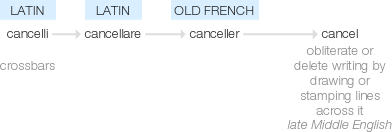Cancel
late Middle English (in the sense ‘obliterate or delete writing by drawing or stamping lines across it’): from Old French canceller, from Latin cancellare, from cancelli ‘crossbars’.
wiktionary
From Middle English cancellen, from Anglo-Norman canceler(“to cross out with lines”) (modern French chanceler(“unsteady move”)), from Latin cancellō(“to make resemble a lattice”), from cancellus(“a railing or lattice”), diminutive of cancer(“a lattice”).
etymonline
cancel (v.)
late 14c., "cross out with lines, draw lines across (something written) so as to deface," from Anglo-French and Old French canceler, from Latin cancellare "to make like a lattice," which in Late Latin took on especially a sense "cross out something written" by marking it with crossed lines, from cancelli, plural of *cancellus (n.) "lattice, grating," diminutive of cancer "crossed bars, a lattice," a variant of carcer "prison" (see incarceration).
Figurative use, "to nullify (an obligation, etc.)" is from mid-15c. Related: Canceled (also cancelled); cancelling.
